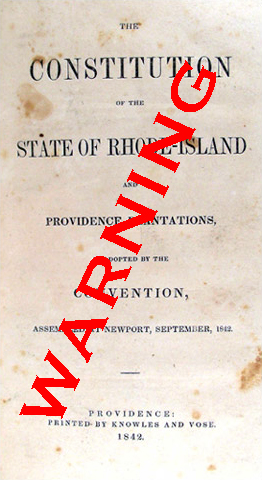 The prospect of a Constitutional Convention in Rhode Island is among the most prescient and hotly debated issues in Rhode Island politics today. Detractors of a Con-Con worry that the influence of monied special interests would essentially buy their way into a constitution that benefits those special interests. Supporters say that the convention would be a perfect opportunity to equalize, to some extent, the balance of power between our legislative and executive branches. These are certainly not the only pro/con arguments vis-a-vis a constitutional convention, and both sides have extremely valid points, but one radical idea that I think is missing from the discussion is the opportunity to create a unicameral legislature in Rhode Island.
The prospect of a Constitutional Convention in Rhode Island is among the most prescient and hotly debated issues in Rhode Island politics today. Detractors of a Con-Con worry that the influence of monied special interests would essentially buy their way into a constitution that benefits those special interests. Supporters say that the convention would be a perfect opportunity to equalize, to some extent, the balance of power between our legislative and executive branches. These are certainly not the only pro/con arguments vis-a-vis a constitutional convention, and both sides have extremely valid points, but one radical idea that I think is missing from the discussion is the opportunity to create a unicameral legislature in Rhode Island.
For many years, the R.I. House and Senate have suffered from a serious disconnect. While the two bodies may convene mere steps away from one another, there seems to be a gaping intellectual and ideological chasm between them. All too often, bills that have broad-based support in the House fail to even make their way out of committee on the Senate side, and those that do often face unwarranted scrutiny and kibbitzing on the Senate side. Let’s look at some examples.
- Last year, the issue of Same Sex Marriage was passed from the House floor 51-19; an overwhelming majority. When the bill reached the Senate, there was an effort to change the bill by inserting some outrageously discriminatory language concerning the “rights” of business owners to refuse their services to prospective same sex couples if they had a religious or moral compunction to do so. Most civil liberty watchdogs saw that these provisions fell dangerously close to “separate but equal,” and the bill eventually passed into law unadulterated due, in large part, to (GASP!) Senate Republicans.
- For the last four years, the issue of Payday Lending Reform has garnered a lot of attention. The coalition behind the reform legislation has worked tirelessly to inform the legislature on the predatory lending practices of these institutions, and last year had support from 52 of 75 Representatives and 28 of 38 Senators, but can’t seem to make it out of committee on either side. While this is not indicative of the disconnect between the two bodies, it is indicative of the influence of lobbies on our legislature. Despite the broad support, one man, former Speaker of the House and lobbyist for one of the two payday lenders operating in Rhode Island, Bill Murphy, seems to be single-handedly preventing the legislature from executing the people’s will.
- This week, the move to abolish the master lever, or single-party vote, passed through the House unanimously, 71-0. The bill has 18 cosponsors in the Senate – which is just one shy of the votes it would take to pass this bill – and yet, it seems that Senate President Teresa Paiva-Weed is all but completely ignoring what most rational folks would call a mandate, and not immediately urging the Senate Judiciary Committee to move the bill to the Senate floor for a straight up/down vote. Paiva-Weed has vowed to “keep an open mind” and “review the testimony,” but those statements are akin to your parents’ answer of ‘maybe’ when you ask if you can have ice cream. 99 times out of 100, maybe means no.
So, why is there this gap between the House and Senate? The House is arguably a more accurately representational body than the Senate, so why is the Senate not taking their cues from their colleagues in the House? Frankly, I am at a loss as to why this happens, but I think that a unicameral legislature would go a long way to fixing this problem while, at the same time, streamlining the committee process.
In a unicameral legislature, the number of committees could be cut in half. No longer would concerned citizens and public interest groups have to attend two committee hearings on the same issue, delivering the same testimony to both bodies. No longer would electeds have to serve on more than two committees, which often forces them to duck out of one committee meeting to attend another, often missing critical testimony on a particular issue. I daresay we could expand the membership of existing committees, which could – and would – provide for a more vigorous vetting process for proposed legislation.
Keep in mind, I am not proposing to eliminate the Senators, just the Senate. The unicameral legislature would become a single body of 113 members, with half the number of committees to staff, and cut staffers at the state house in half. Just having a single press bureau for the legislature would cut spending significantly.
Over the years, there has been a lot of speculation of the effects of consolidating municipal services in Rhode Island. Most agree that we could save a ton of money by allowing cities and towns to share services and financial burdens, but let’s start by looking to the body that affects all of Rhode Island: our fractured General Assembly.
(Note: The only state in the U.S. that has a unicameral legislature is Nebraska. Their legislative elections are also non-partisan, which is a whole other post!)



